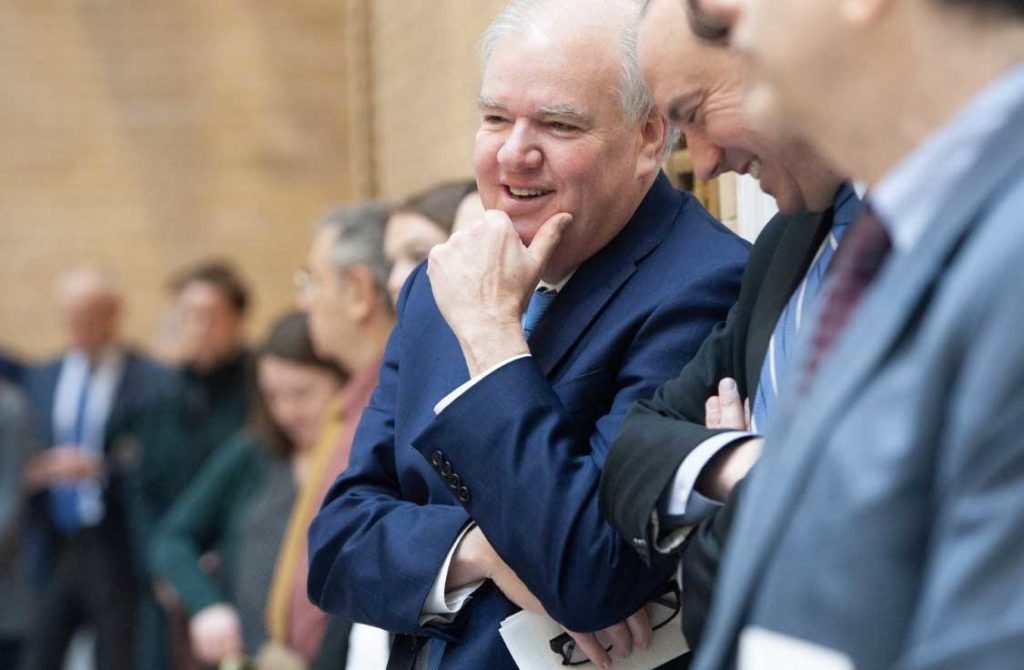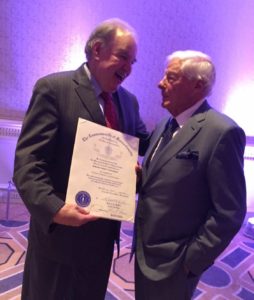He knows, with the heart of a thankful immigrant’s son, that gratitude is an action word.
He is the “Dean” of the Massachusetts House of Representatives – a title bestowed for the longest continuous tenure in the State House, at 34 years and counting – and as he sat with a visitor recently to reflect on his own, rarely paralleled career in public service, that gratitude momentarily overflowed.
Honan was asked about the Rappaport Urban Scholarship that in 1997 afforded him the opportunity to attend the Harvard Kennedy School of Government, adding educational rocket fuel to a legislative career that was already well beyond liftoff.
“I always go out of my way to thank him, for what he’s done for me and so many of my colleagues,” he said of the foundation’s patriarch, Jerry Rappaport. “I would not have been able to access the extraordinary resources of the Kennedy School without him and the Foundation.”
Honan then paused. He put two fingers under his glasses to wipe away a bit of accumulating moisture, then warned with a smile not to mention it. “I’m supposed to be tough,” he said.
But why, he was pressed, do the Rappaports mean so much to him?
“We’re public servants making public servant wages,” he said, “so a scholarship to the Kennedy School is a very special gift that they’ve given public officials here.
“That’s what I’ll be forever grateful for.”
It would be hard to imagine anyone more hardwired for public service, built from the ground up to lead a life dedicated to bettering people’s lives, than Kevin Honan. His parents were good at explaining to him and his two siblings – older sister Claire, who would become a nurse, and younger brother Brian, a future city councilor – about the benefits of giving back, but even better at showing them.
Their father had been raised in poverty on a farm in Kilmihil, County Clare, Ireland, before seeking out the promise of America. He served the United States Army in the Korean War and then settled in the Allston-Brighton neighborhood of Boston, where he raised the family and was a member of the Local 550 Sprinkler Fitters Union. His backyard was the community’s backyard, and the nightly cookouts to feed half the neighborhood served as Exhibit A.
Their mother, a 33-year lunch monitor at the local Andrew Jackson Elementary School, volunteered with the Ward 21 Democratic Committee. She was a first-generation American herself, her parents both from Ireland and her father the custodian for the apartments on their very own Gordon Street. Yes, she made sure that her own yard was tidy, but she also insisted that the entrance to nearby Ringer Park be just as clean, so grab a broom and let’s go. If the local basketball court hoops were without nets, Kevin knew whose job it was to put new ones up.
“That was instilled in all of us, how grateful we should be to live here in this wonderful country, this wonderful neighborhood,” Honan said. “We were taught by example to give back, and that’s what we did every day.”
There was no shortage of opportunities to do just that. When his mother worked the polls, young Kevin would bring the coffee. When a local public official showed up at the basketball courts to invite the 14-year-old to help promote an upcoming event for Congressman Tip O’Neill, he quickly ran home and got into his best clothes. When a middle school classmate was hit by a car crossing Cambridge Street, he was among the students protesting until a light and crosswalk were installed.
And when then-City Councilor Ray Flynn showed up to picket in front of local apartments buildings that were being hit with seemingly unjust rent increases, Honan and his friends lined up with him.
“It was a very political neighborhood to grow up in,” he said. “There was always something going on in the community, and we didn’t stand on the sidelines. We were involved.
“We just did it. It was the neighborhood we grew up in. It was the neighborhood we cared about.”
It was also quite evident to Honan how this neighborhood he so adored had been positively impacted by the work of a dedicated public servant. State Rep. Norman Weinberg, who would later become a district court judge after representing Allston-Brighton in the State House for 26 years, was in large part responsible for the development of the local West End House Boys and Girls Club, which since 1971 has served as a second home to Honan and like-minded kids in town.
“I could see the impact of public service on a community from an act like that,” he said. “We all grew up in a safe, caring Boys and Girls Club in Allston because of the local state rep, and that really made an impression on me.”






